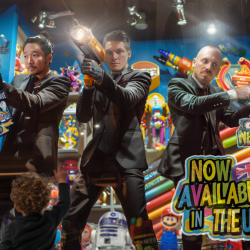It’s not surprising that there’s a level of inertia around AI and its impact right now
However, arguably, people’s frustration with it isn’t down to its lack of capability. It’s that it’s being continuously pushed our way. This is particularly true in the marketing world; everyone is climbing over everyone else to get AI into every sentence, every brand campaign, and every product. And it’s not because it’s the best for each respective activity. Often, it’s for fear of appearing out of touch.
The same happened with the likes of NFTs and Metaverse. Take the latter: in the months following the Meta announcement it seemed that every company had a metaverse product on offer, despite it not being obvious what it was, or why it should be. Today, it’s not really heard of. Arguably, it’s the hype that’s died not the tech. But herein lies the problem. Too much of a good thing, in this case a tech with exciting applications, can be done to death, and that has an impact. The reality is that no matter what technology, it will only be genuinely helpful if applied with purpose and to genuine effect. Clearly, this doesn’t just apply to AI. Nothing works if it’s done ‘for the sake of it’, because customers see right through it. And more importantly, what value does it add?
It’s an important consideration because, on the whole, AI is set to add a lot of consumer value. For example, AI is poised to revolutionise hyper-personalisation. Incorporating AI into the ecommerce tech stack will help build more detailed customer profiles, analyse customer behaviours, and segment potential buyers. As a result, brands will get to know their customers’ preferences and shopping habits far better, too. This level of customer understanding, coupled with AI’s accuracy and efficiency, will also improve search and discovery, enabling improved product recommendations and interactions, almost like the ultimate personal shopper. AI will help retailers surface the most relevant things — the products customers have an affinity for — and use the information to populate the first few pages they see.
This is incredibly important for consumers — 75% leave a site after two minutes if they cannot find the desired product or service.
Ultimately, a brand’s goal is to understand its audience and be capable of tailoring its offering to suit those customers. It’s the foundation upon which successful brands are built, and that base is increasingly ‘AI-generated’. Of course, it’s not just personalisation. The likes of content creation and organisational efficiency will also support creativity and resource allocation.
In other words, AI is legit. It’s not just part of the brand bubble
However, the phrase ‘more is not always better’ is very accurate for AI. So, while it might be tempting to dive straight in and utilise every AI tool available, this won’t get the contextual content and outputs needed to create differentiated, exceptional experiences for a brand’s customers. Instead, a good way of thinking about it is: what does this AI campaign or concept solve for customers? For example, Salesforce found that AI accounted for $194 billion in online holiday sales, primarily through predictive recommendations. This suggests that, as per the aforementioned benefits of hyper-personalisation, AI is getting customers to the products they seek and improving their brand experience. Applications such as this are more likely to break the AI inertia, and prove that it will genuinely improve the lives of consumers.
So what should brands do? Continually monitor the relevance and performance of the technology you integrate, assessing the accuracy and value of the outputs. This ongoing evaluation will help identify whether the AI services will meet users’ needs and align with brand goals. In short, If it’s not helping to solve challenges previously identified, break the marketing hype cycle and don’t use it.
Featured image: Sunder Muthukumaran / Unsplash


























